Joy Huang
Posts tagged with Library Student Engagement Program in Blog Student Stories
Showing 11 - 20 of 21 items

Pressure ulcers are injuries to the skin and underlying tissue that form due to prolonged pressure. Bedridden patients are the most susceptible to these wounds, so hospital nurses need to turn them every few hours to alleviate the built-up pressure. In public hospitals like San Juan de Dios in Guatemala City, there is a high incidence of these wounds due to understaffing.
Currently, hospitals in Guatemala have egg carton foam mattresses intended to reduce the incidences of bedsores. However, even with these mattresses, patients who are not turned would still develop preliminary pressure ulcers in as little as six hours. Additionally, it is difficult for nurses in this hospital to prioritize and communicate which patients need to be turned because they use paper and pencil to track the patients. Thus, current prevention methods would benefit from engineering solutions that reduce the physical and mental demand on nurses to turn patients.
Currently, hospitals in Guatemala have egg carton foam mattresses intended to reduce the incidences of bedsores. However, even with these mattresses, patients who are not turned would still develop preliminary pressure ulcers in as little as six hours. Additionally, it is difficult for nurses in this hospital to prioritize and communicate which patients need to be turned because they use paper and pencil to track the patients. Thus, current prevention methods would benefit from engineering solutions that reduce the physical and mental demand on nurses to turn patients.
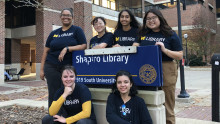
The U-M Library Student Ambassadors are a team of students who work for the library to promote library services and resources to students through targeted social media campaigns and digital exhibits, publicize and host library events that foster engagement, diversity, and inclusion, suggest ways to improve student experience by participating in meetings and focus groups with library staff, and represent the U-M Library at campus fairs and events. Their work is highly collaborative and a goal of the program is to give them the agency to make their own decisions and plans for the year. These governing principles allow for a highly creative and fun environment that results in some really great library programs each year. Here’s a reflection from four of our recent Ambassadors.
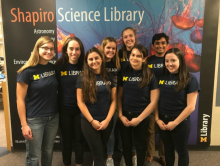
As much as being a Student Engagement Ambassador is about having fun and creating new and exciting ways for students to interact with our Library, it is also about developing professionally and learning more about yourself. Some of our Student Engagement Ambassador staff take a look back on this academic year to share what they’ve learned about the Library and themselves while serving in this position.
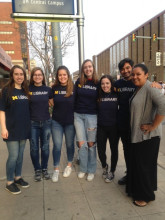
The Library Student Engagement Ambassadors were back this semester with new events and some tried and true favorites. Always striving to show that the Library is more than just a place to study and check out books, this group of seven undergraduate students worked hard during the Winter semester to bring the U-M community fun and exciting events from the UGLi and beyond. Check out what we were up to this semester and be on the lookout for more Engagement Ambassador events in the Fall term.
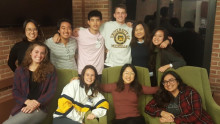
Project Alivio is a multidisciplinary global health project team that is a part of Michigan Health Engineered for All Lives (M-HEAL). Our goal is to reduce the incidence rate of pressure ulcers in San Juan de Dios hospital. What makes us unique as a project team is that our 19 students work as a co-design team with the Students Association of International Medical Research (SAIMER), a medical student organization from the Universidad de San Carlos in Guatemala City. As we design our solution, we are constantly receiving input from peers our age with more medical experience at our target location.
Pressure ulcers, or bedsores, form when a patient is exposed to pressure for a prolonged period of time. This pressure restricts proper blood flow to a certain area on the body, usually the coccyx, heels, back of head, or elbows, causing skin and tissue damage. To prevent pressure ulcers, nurses turn patients to offload the pressure exerted on the body. Pressure ulcers have high incidence rates in Guatemala City for many reasons, but the factor we are targeting is the understaffing of nurses.
Our team meets for several hours a week to design, build, discuss progress, and plan next steps. With the input of professors, physicians, and nurses from both universities, we hope to design a sustainable solution for our end-users. We also value offering our members a meaningful and educational project experience.
This spring, from April 29th to May 10th, seven of our members will be traveling to Antigua, Guatemala. In past, we have made two trips to Guatemala to conduct a needs assessment, which is how we narrowed the need to pressure ulcer prevention. This will be the first trip that is focused on the design itself. We will bring some sketches and prototypes of different concepts to show to our stakeholders to receive feedback. Besides the project itself, the trip will be a great opportunity for some of our newer members to learn more about the global health scene and feel connected to this project.
Pressure ulcers, or bedsores, form when a patient is exposed to pressure for a prolonged period of time. This pressure restricts proper blood flow to a certain area on the body, usually the coccyx, heels, back of head, or elbows, causing skin and tissue damage. To prevent pressure ulcers, nurses turn patients to offload the pressure exerted on the body. Pressure ulcers have high incidence rates in Guatemala City for many reasons, but the factor we are targeting is the understaffing of nurses.
Our team meets for several hours a week to design, build, discuss progress, and plan next steps. With the input of professors, physicians, and nurses from both universities, we hope to design a sustainable solution for our end-users. We also value offering our members a meaningful and educational project experience.
This spring, from April 29th to May 10th, seven of our members will be traveling to Antigua, Guatemala. In past, we have made two trips to Guatemala to conduct a needs assessment, which is how we narrowed the need to pressure ulcer prevention. This will be the first trip that is focused on the design itself. We will bring some sketches and prototypes of different concepts to show to our stakeholders to receive feedback. Besides the project itself, the trip will be a great opportunity for some of our newer members to learn more about the global health scene and feel connected to this project.

The Student Rights Project (SRP) is an interdisciplinary consortium of Law, Social Work, and Education graduate students specially trained to advocate for the educational rights of K-12 students across Southeast Michigan. Through our unique community-university partnership with the Student Advocacy Center of Michigan, SRP trains volunteers to advocate for students facing suspension and expulsion to ensure that every student’s right to an education is protected.
Dismantling the school-to-prison pipeline is at the core of our mission. We recognize that zero tolerance policies, often codified in school disciplinary codes of conduct, subject students to severe and punitive discipline, criminalizing typical behavior and resulting in academic disengagement, failure, push-out, and delinquency. Moreover, schools and administrators must adapt their disciplinary processes, including their codes of conduct, to reflect changing local, state, and federal educational laws.
Thus, as a part of our advocacy work, SRP launched the School Code Project to work with public schools across Michigan to review and revise school codes of conduct. The purpose of this project is to challenge institutional threats to students’ educational rights and encourage schools to align their codes of conduct with evidence-based, nationally recognized best practices for responding to student misbehavior.
Dismantling the school-to-prison pipeline is at the core of our mission. We recognize that zero tolerance policies, often codified in school disciplinary codes of conduct, subject students to severe and punitive discipline, criminalizing typical behavior and resulting in academic disengagement, failure, push-out, and delinquency. Moreover, schools and administrators must adapt their disciplinary processes, including their codes of conduct, to reflect changing local, state, and federal educational laws.
Thus, as a part of our advocacy work, SRP launched the School Code Project to work with public schools across Michigan to review and revise school codes of conduct. The purpose of this project is to challenge institutional threats to students’ educational rights and encourage schools to align their codes of conduct with evidence-based, nationally recognized best practices for responding to student misbehavior.
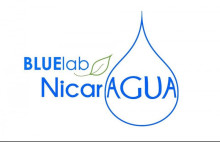
The BLUElab NicarAGUA team, in partnership with FNE International, has been collaborating with the El Jicaral, Nicaragua community since September 2015. Since that time, three in-country trips have been conducted. First, in 2016, a preliminary needs assessment trip was conducted in the surrounding communities. Through extensive surveys and interviews with members of communities visited, it was determined that the greatest need of this community was access to water during the dry season.
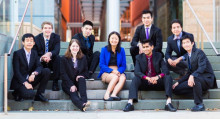
Perch’s mission is to make research more accessible to undergraduates.
UROP, the Undergraduate Research Opportunity Program, does a great job at its mission: helping underrepresented and first-generation students gain their first research experience and make the most of it. When UROP started 25 years ago, it was able to accommodate every eligible student who applied.That’s no longer true. The number of undergraduates seeking research experience has grown tremendously in the last decade. Why?
For many students, undergraduate research is their first experience working on real-world problems that may provide widespread impact and help people in the future. Through research, students gain valuable critical thinking skills, a new way of asking questions. Research is a chance for students to apply what they’ve learned in class to the real world, to venture boldly beyond the maps of the known. Research is a chance to improve people’s lives, it’s the chance to get a law of nature named after you, it’s the universe trying to understand itself. Not to mention that undergraduate research experience is now necessary rather than an added bonus when applying to graduate school, industrial R&D jobs, and numerous other career paths.
UROP, the Undergraduate Research Opportunity Program, does a great job at its mission: helping underrepresented and first-generation students gain their first research experience and make the most of it. When UROP started 25 years ago, it was able to accommodate every eligible student who applied.That’s no longer true. The number of undergraduates seeking research experience has grown tremendously in the last decade. Why?
For many students, undergraduate research is their first experience working on real-world problems that may provide widespread impact and help people in the future. Through research, students gain valuable critical thinking skills, a new way of asking questions. Research is a chance for students to apply what they’ve learned in class to the real world, to venture boldly beyond the maps of the known. Research is a chance to improve people’s lives, it’s the chance to get a law of nature named after you, it’s the universe trying to understand itself. Not to mention that undergraduate research experience is now necessary rather than an added bonus when applying to graduate school, industrial R&D jobs, and numerous other career paths.

A week or so ago, I went to pick up a book from Hatcher when my attention was captured by a Bikini Kill poster. It was part of an exhibit in the Hatcher North Lobby on feminist zines. As I wandered through the display of drawings, poems, rants, cartoons, and collages, I was struck by the unique power that zines have to speak directly to the heart. Even though these zines were made and distributed decades ago, I still found myself nodding in agreement with the insights and raw emotions found in their pages.
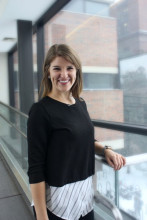
The library is more than a place to read, study, or research. As the Graduate Intern for the Library Student Engagement Program I have found that library to be a place that stimulates creativity, fosters self-efficacy, and even creates a bit of fun. To me, the library has become a place for growth, where engaged learning is not merely in a classroom, but also in the place that prepares students for the classroom. As the program assistant for the Library Student Engagement Ambassadors, I see this transformative learning firsthand, and even better, I experience it alongside the students I mentor.